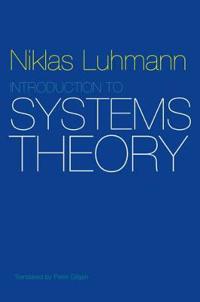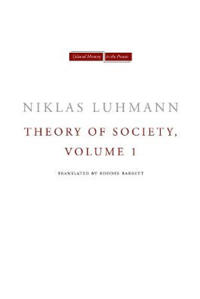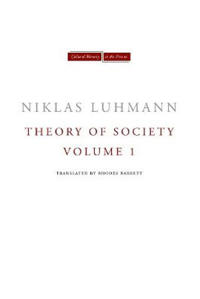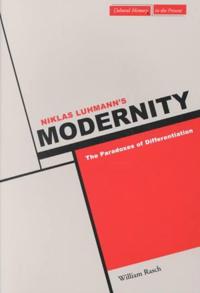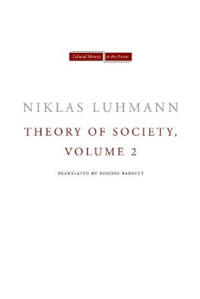The Reality of the Mass Media (Pocket)
avNiklas Luhmann, Kathleen (TRN) Cross, Niklas Luhmann
ISBN: 9780804740777 - UTGIVEN: 2000-07Law as a Social System (Inbunden)
avNiklas Luhmann
ISBN: 9780198262381 - UTGIVEN: 2004-03Modern systems theory provides a new paradigm for the analysis of society. In this volume, Niklas Luhmann, its leading exponent, explores its implications for our understanding of law. Luhmann argues that current thinking about how law operates within a modern society is seriously deficient. In this[...]
Law as a Social System (Häftad)
avNiklas Luhmann
ISBN: 9780199546121 - UTGIVEN: 200806Modern systems theory provides a new method for the analysis of society through an examination of the structures of its communications. In this volume, Niklas Luhmann, the theory's leading exponent, explores its implications for our understanding of law. Luhmann argues that current thinking about ho[...]
Risk (Häftad)
avNiklas Luhmann
ISBN: 9780202307640 - UTGIVEN: 200502A great deal of attention has been devoted to risk research. Theoretical sociology, however, has shown little interest in it. Sociologists in general have limited themselves to varying recognitions of a society at risk and have traced out the paths to disaster. The detailed research has yet to be un[...]
Niklas Luhmann (Storpocket)
avChristian Borch
ISBN: 9780415490948 - UTGIVEN: 201103Niklas Luhmann offers an accessible introduction to one of the most important sociologists of our time. It presents the key concepts within Luhmann's multifaceted theory of modern society, and compares them with the work of other key social theorists such as Jurgen Habermas, Michel Foucault, and Zyg[...]
Niklas Luhmann: Law, Justice, Society (Häftad)
ISBN: 9780415685283 - UTGIVEN: 2011-07Niklas Luhmann: Law, Justice, Society presents the work of sociologist Niklas Luhmann in a radical new light. Luhmann's theory is here introduced both in terms of society at large and the legal system specifically, and for the first time, Luhmann's texts are systematically read together with theoret[...]
A Sociological Theory of Law (Inbunden)
avNiklas Luhmann
ISBN: 9780415858960 - UTGIVEN: 2013-10Niklas Luhmann is recognised as a major social theorist, and his treatise on the sociology of law is a classic text. For Luhmann, law provides the framework of the state, lawyers are the main human resource for the state, and legal theory provides the most suitable base from which to theorize on the[...]
Love as Passion - The Codification of Intimacy (Häftad)
avNiklas Luhmann
ISBN: 9780745600789 - UTGIVEN: 201204This classic book by Niklas Luhmann - one of the leading social thinkers of the late 20th century - analyses the emergence of 'passionate love' as the basis of personal relationships in modern societies.[...]
Reality of the Mass Media (Inbunden)
avNiklas Luhmann
ISBN: 9780745621319 - UTGIVEN: 2000-06In The Reality of the Mass Media Luhmann extends his theory of social systems - applied in his earlier works to the economy, the political system, art, religion, the sciences and law - to an examination of the role of mass media in the constitution of social reality. Luhmann argues that the system o[...]
Reality of the mass media (Pocket)
avNiklas Luhmann
ISBN: 9780745621326 - UTGIVEN: 200005In this text, Luhmann extends his theory of social systems applied in his earlier works to the economy, political administration, art, religion, the sciences and the legal system, to an examination of the role of mass media in the constitution of social reality.[...]
Introduction to Systems Theory (Häftad)
avNiklas Luhmann
ISBN: 9780745645711 - UTGIVEN: 2012-10-31Niklas Luhmann (1927-1998) ranks as one of the most important sociologists and social theorists of the 20th century. This title offers conceptual analyses and examples to clarify the theoretical foundations of general and sociological systems theory.[...]
Introduction to Systems Theory (Häftad)
avNiklas Luhmann, Dirk Baecker
ISBN: 9780745645728 - UTGIVEN: 201212Niklas Luhmann ranks as one of the most important sociologists and social theorists of the twentieth century. Through his many books he developed a highly original form of systems theory that has been hugely influential in a wide variety of disciplines.In "Introduction to Systems Theory," Luhmann ex[...]
Social Systems (Häftad)
avNiklas Luhmann, Dirk Baecker
ISBN: 9780804726252 - UTGIVEN: 199602A major challenge confronting contemporary theory is to overcome its fixation on written narratives and the culture of print. In this presentation of a general theory of systems, Niklas Luhmann, Germany's most prominent and controversial social thinker, sets out a contribution to sociology that rewo[...]
Love as Passion (Häftad)
avNiklas Luhmann
ISBN: 9780804732536 - UTGIVEN: 199903"I believe that Luhmann is the only true genius in the social sciences alive today. By this, I mean that not only is he smart, extremely productive, and amazingly erudite, though all this is true enough, but also that he has, in the course of an improbable career, elaborated a theory of the social t[...]
Art as a Social System (Häftad)
avNiklas Luhmann
ISBN: 9780804739078 - UTGIVEN: 200008This is the definitive analysis of art as a social and perceptual system by Germany s leading social theorist of the late twentieth century. It not only represents an important intellectual step in discussions of art in its rigor and in its having refreshingly set itself the task of creating a set o[...]
Niklas Luhmann's Modernity (Häftad)
avWilliam Rasch
ISBN: 9780804739924 - UTGIVEN: 2000-12This book is an introduction to the nature of modernity as envisioned by Germany's leading social theorist of the late twentieth century, Niklas Luhmann. For Luhmann, modernity is neither an Enlightenment project nor a ludic rejection of that project, but rather the pre-condition of all our delibera[...]
Theories of Distinction (Häftad)
avNiklas Luhmann
ISBN: 9780804741231 - UTGIVEN: 200202The essays in this volume formulate what is considered to be the preconditions for an adequate theory of modern society. The first two essays deal with the modern European philosophical and scientific tradition. The next four essays concern the notion of observation as defined by Luhmann. They exami[...]
Theory of Society, Volume 2 (Häftad)
avProfessor Niklas Luhmann
ISBN: 9780804771603 - UTGIVEN: 201308This second volume of Niklas Luhmann's two-part final work was first published in German in 1997. The culmination of his thirty-year theoretical project to reconceptualize sociology, it offers a comprehensive description of modern society. Beginning with an account of the fluidity of meaning and the[...]
Niklas Luhmann (e-bok)
avChristian Borch
ISBN: 9781134008308Niklas Luhmann offers an accessible introduction to one of the most important sociologists of our time. It presents the key concepts within Luhmann's multifaceted theory of modern society, and compares them with the work of other key social theorists such as Jurgen Habermas, Michel Foucault, and Zyg[...]













